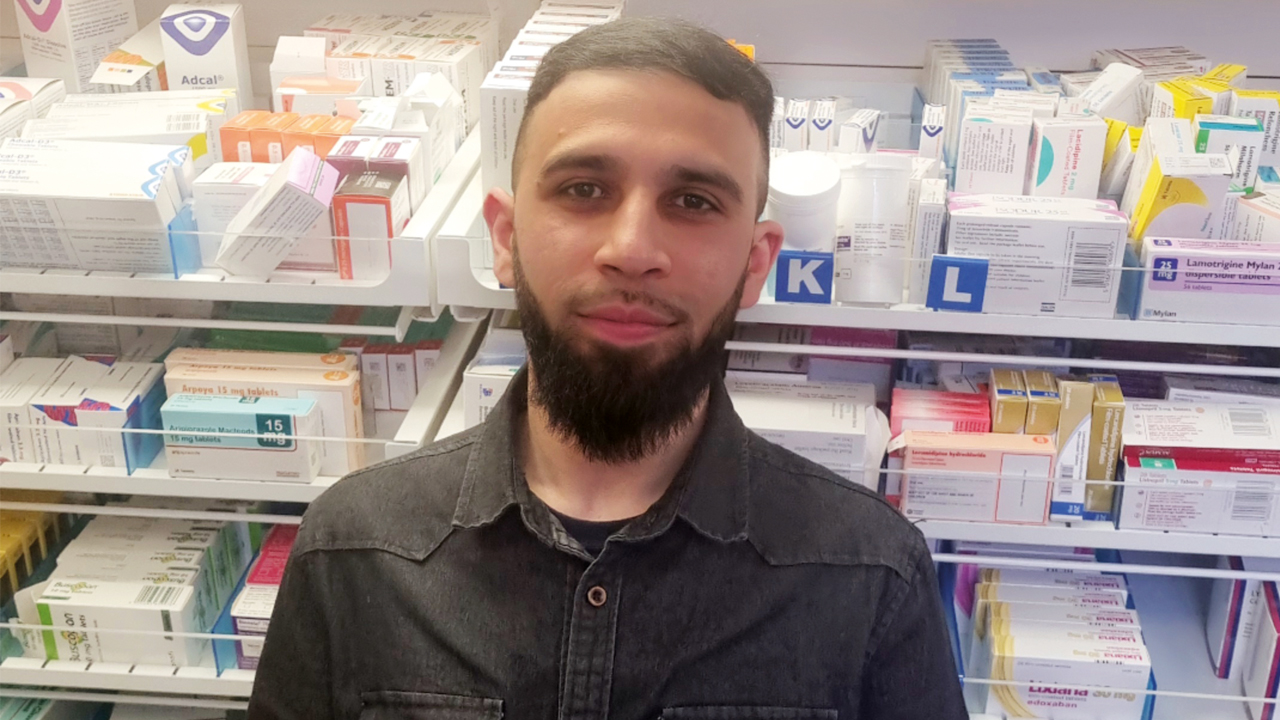In Practice
Follow this topic
Bookmark
Record learning outcomes
“Give back, be kind, be good to people.” These are the words that first encouraged Farhaan Musaji to embark on a career in pharmacy. As a teenager, Farhaan was at a crossroads after finishing school; to go on to do his A-Levels and take the University route, or to start a career straight away. Although he finished with good grades – A’s and B’s – he didn’t know what he wanted to do next. “When I was undecided, [my dad] suggested pharmacy, as there is a large part of the job that involves helping people.” Fast forward 11 years, Farhaan, known to his customers and community as ‘Faz’, is a pharmacy dispenser with his sights on qualifying as an accuracy checking technician.
Farhaan’s journey began like many in the pharmacy, as an apprentice straight out of school, looking to learn and take on as much as possible. He was then a locum dispenser for four years before becoming full-time three years ago. “Day-to-day, I’m pretty much hands-on with everything!” says Farhaan. From dispensing and labelling to managing and ordering stock, Farhaan’s day is jam-packed. “I also sell over-the-counter (OTC) products, advise customers and do the methadone service.” Some of the methadone patients have been customers for years, which has allowed Farhaan to develop relationships with each person. “With this service, I think it is important to know people by name. We are quite good friends, really,” he said.
Important relationships
For Farhaan, it is not only important to know your customers personally to encourage trust and approachability, but also because some customers rely on their relationship with him to understand their prescriptions. “We’re in quite a diverse area, where we have a lot of Asian people, and English isn’t their first language. You can imagine how difficult it must be, trying to understand.” Farhaan notes that the system can be confusing for some people, who go for their seasoned appointment, are given a prescription and ‘that’s it’. “That’s where I come in, I can speak Urdu and Gujarati, so it is a big help. I explain to them things that they wouldn’t understand in English, like if they are getting benefits, or if I need to explain exemptions to them – it can make a big difference knowing whether they have to pay for something or not.” Farhaan’s language skills are a huge asset to the pharmacy, especially as he estimates that around 75 per cent of the pharmacy’s community belong to this group.
On top of working full time, Farhaan finds the energy to study towards his NVQ3 qualification which will see him qualify in a year and a half. “With everything I do at work with dispensing and labelling, I don’t have time to do my course at work. I do it all at home. I am quite busy now,” says Farhaan. He is encouraged to continue with his studies after waiting a long time for the opportunity to arise. “Ever since I became NVQ2-qualified, when I was around 16 years old – a long time ago now – I wanted to go on to Level 3. I just never had the opportunity to move on to it. Now that I’ve finally got the opportunity, I’ve literally just grabbed it with two hands.”
“Farhaan’s language skills are a huge asset to the pharmacy, especially as he estimates that around 75 per cent of the pharmacy’s community belong to this group”
The pick of the bunch
When asked what he finds most rewarding in his role at Rigby’s Chemist in Bolton, it is feeling like they are the chosen pharmacy in the area, Farhaan notes. “There are a lot of chemists in our area, in the same radius. What is encouraging is when people come to our store because others do not have what they needed in stock or were not able to help them. We are always available and have managed to keep a lot of stock. It helps that there are 12 of our shops, so if we do not have something, I can ring one of our other branches and organise the medication.”
This feeling of being relied on to provide the healthcare that customers need is what keeps Farhaan at the pharmacy until late. “I regularly work after closing time if I know someone has got delayed on their way to pick up medication. There’ll be a call at 5:55pm (we close at 6pm) from a patient saying they are stuck in traffic or some other reason. I’ll wait behind and make sure the person gets their medication, so they don’t panic.” And, if the customer can’t make it to the pharmacy, Farhaan takes the pharmacy to them! “I do some of the deliveries myself. It can happen that a prescription comes in late and it’s too late to get a delivery person, or in the case of elderly people who live on their own, they don’t have anyone else to collect the medication for them.” It’s certainly clear that after 11 years, Farhaan is most definitely upholding the motto impressed on him all that time ago.

